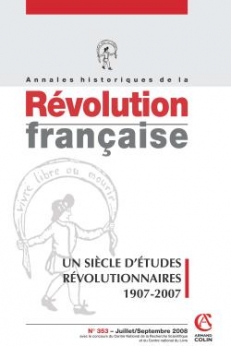
Annales historiques de la Révolution française n° 353 (3/2008)
Pour acheter ce numéro, contactez-nous
Recevez les numéros de l'année en cours et accédez à l'intégralité des articles en ligne.
Cet article évoque les rapports vacillants entre la Société des études robespierristes, fondée il y a cent ans, et le Comité International des sciences historiques, créé dans les années 1920 après la fin de la Grande Guerre. Le CISH considérait sa tâche comme un effort missionnaire dans une Europe fracturée par les divisions politiques et idéologiques, et de plus en plus en proie à la violence et à l’intolérance. Comment les Robespierristes devaient-ils y répondre ? L’examen des pages des Annales historiques de la Révolution française ainsi que des Bulletins du CISH suggère que les rapports ne furent pas toujours très chaleureux, même si, dès les tout débuts, ceux qui contribuaient aux colloques du CISH étaient assez souvent eux-mêmes robespierristes. Pendant de longues années – après 1940 surtout – les historiens de la Révolution ne figurèrent pas beaucoup au sein du CISH, mais à partir de 1960 on fit un nouvel effort pour créer une Commission internationale affiliée, effort qui réussit finalement en 1975 à San Francisco. Depuis, cette commission s’est beaucoup développée, mais sans jamais perdre ses liens étroits avec la Société.
This article traces the fl uctuating relations that have existed between the Société des études Robespierristes, which is now celebrating its centenary, with the younger International Committee of Historical Sciences, created in the years after 1920 against the backcloth of a historical, community still broken and divided by the First World War and its aftermath. The Committee saw itself as having a missionary function and sought to bring together historians of countries divided by politics and ideology. How should the Robespierristes respond? The evidence of the pages of the AHRF and those of successive Bulletins of the Committee suggest that relations were often strained, even though the historians who contributed on revolutionary themes to the work of the World Historical Congresses were often themselves members of the Society. During a lengthy period - especially after 1940 - historians of the revolution appeared less frequently at these Congresses, until, from around 1960, they made a renewed effort to seek affiliation. This proved a lengthy frustrating experience, until in 1975, at San Francisco, an affi liated commission on the French Revolution was admitted. Since then that Commission has considerably evolved, without losing its close association with the Society.